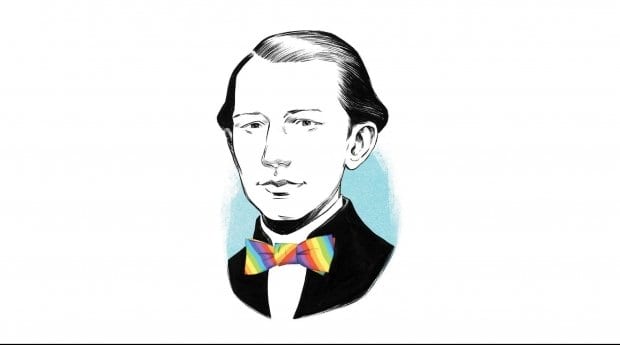Leading up to the 2014 Winter Olympics in Sochi, Vladimir Putin said, “Tchaikovsky was gay — although it’s true that we don’t love him because of that — but he was a great musician and we all love his music. So what?”
What he meant was “Because we like gay ol’ Tchaikovsky, Russia’s laws can’t possibly be discriminatory toward homosexuals.” It was along the lines of the “some of my best friends are black” defence used by so many deluded racists.
Putting aside that Russia’s anti-gay laws show Putin to be a liar, his words indicate how ill at ease he actually is with Tchaikovsky’s homosexuality.
He was trying to kill two birds with one stone — justifying having a gay man as a national icon and convincing the world Russia was fit to host the Olympics — so he demonstrated his oh-so-wonderful tolerance by essentially saying, “We don’t like his sexual orientation, but we try to ignore that because we like him for other reasons. That’s good enough, right?”
No, not really.
And anyway, doesn’t Tchaikovsky’s memory deserve more? His homosexuality isn’t all that he was, but it’s certainly something that should be acknowledged and even appreciated a little bit, in part because it gave him a perspective that to some degree informed his creation of such beautiful music — music that Putin claims to love.
Born in 1840, Pyotr Ilyich Tchaikovsky had a long and winding career that is probably best studied via music textbooks. I’m more interested in focusing on the details that Putin is so eager to brush under the carpet.
Tchaikovsky studied at a boarding school in Saint Petersburg from 1850 to 1859. As is often the way with boarding school, while there he had a chance to explore his gay urges. He had a romantic relationship with a boy named Sergey Kireyev. In his unpublished biography of Tchaikovsky, Tchaikovsky’s brother Modest (also gay) wrote that the relationship was one of the “strongest, most durable and purest amorous infatuations [of Tchaikovsky’s life].”
Around 1866, Tchaikovsky started tutoring 14-year-old Vladimir Shilovsky, and as the years passed, they became quite close. In 1870, Tchaikovsky had an affair with a student named Eduard Sack, which ended with Sack’s suicide in 1873. Years later, Tchaikovsky wrote in his diary, “It seems to me that I have never loved anyone so strongly as him … and his memory is sacred to me.”
Early in 1876, while travelling with Modest and Modest’s seven-year-old deaf and mute pupil Nikolay Konradi, Tchaikovsky became worried that Modest would make sexual advances toward the young boy. Tchaikovsky decided to marry a woman and through this example encourage his younger brother to adopt a more conventional lifestyle.
His marriage plans were delayed by a crush on a coachman and a relationship with another student, Iosif Kotek, about whom he wrote, “My only need is for him to know that I love him endlessly and for him to be a kind and indulgent despot and idol.” In 1877, he finally followed through on his plan and married Antonina Milyukova. It was disastrous (no surprise there) and Tchaikovsky soon left, but Milyukova wouldn’t permit a divorce and the two remained separated.
On a positive note, the experience convinced Tchaikovsky there was little point in trying to repress his desires. In an 1878 letter to his brother Anatoly, he wrote, “Only now, especially after the tale of my marriage, have I finally begun to understand that there is nothing more fruitless than not wanting to be that which I am by nature.”
He seemed to have been at peace with his gay side — even thought it natural — when he died of cholera in 1893.
Some argue that because of his homosexuality, Tchaikovsky must have been such a tortured soul that he caught cholera intentionally (by drinking unboiled water during a cholera epidemic). Or else that he killed himself to avoid some scandal. There’s little evidence of this. In fact, in later life Tchaikovsky seems to have had all he could want. He had become not only a Russian national celebrity, but a world figure. He had close bonds with his family, and he seemed to be always in the company of admiring young men, including his manservant Aleksey Sofronov.


 Why you can trust Xtra
Why you can trust Xtra


